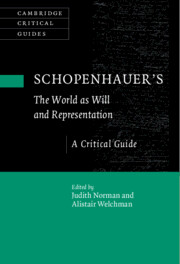Book contents
- Schopenhauer’s The World as Will and Representation
- Cambridge Critical Guides
- Schopenhauer’s The World as Will and Representation
- Copyright page
- Contents
- Contributors
- Acknowledgments
- Note on Texts, Translations, and Abbreviations
- Introduction: Schopenhauer in the Time of Pandemic
- Chapter 1 Different Kinds of Willing in Schopenhauer
- Chapter 2 Resignation
- Chapter 3 Appreciating Nature Aesthetically in The World as Will and Representation: Between Kant and Hegel
- Chapter 4 The Hour of Consecration: Inspiration and Cognition in Schopenhauer’s Genius
- Chapter 5 Experiencing Character as a Key for a Present-Day Interpretation of Schopenhauer
- Chapter 6 Schopenhauer in Dialogue with Fichte and Schelling: Schopenhauer’s Critique of Moral Fatalism and His Turn to Freedom from Willing
- Chapter 7 Schopenhauer’s Philosophy of Religion: (Hopeless) Romanticism?
- Chapter 8 Maja and Nieban in The World as Will and Representation
- Chapter 9 Schopenhauer, Universal Guilt, and Asceticism as the Expression of Universal Compassion
- Chapter 10 Seeing Things: Schopenhauer’s Kant Critique and Direct Realism
- Chapter 11 The Sciences in The World as Will and Representation
- Chapter 12 Pushing Back: Reading The World as Will and Representation as a Woman
- References
- Index
- Cambridge Critical Guides
Chapter 9 - Schopenhauer, Universal Guilt, and Asceticism as the Expression of Universal Compassion
Published online by Cambridge University Press: 08 December 2022
- Schopenhauer’s The World as Will and Representation
- Cambridge Critical Guides
- Schopenhauer’s The World as Will and Representation
- Copyright page
- Contents
- Contributors
- Acknowledgments
- Note on Texts, Translations, and Abbreviations
- Introduction: Schopenhauer in the Time of Pandemic
- Chapter 1 Different Kinds of Willing in Schopenhauer
- Chapter 2 Resignation
- Chapter 3 Appreciating Nature Aesthetically in The World as Will and Representation: Between Kant and Hegel
- Chapter 4 The Hour of Consecration: Inspiration and Cognition in Schopenhauer’s Genius
- Chapter 5 Experiencing Character as a Key for a Present-Day Interpretation of Schopenhauer
- Chapter 6 Schopenhauer in Dialogue with Fichte and Schelling: Schopenhauer’s Critique of Moral Fatalism and His Turn to Freedom from Willing
- Chapter 7 Schopenhauer’s Philosophy of Religion: (Hopeless) Romanticism?
- Chapter 8 Maja and Nieban in The World as Will and Representation
- Chapter 9 Schopenhauer, Universal Guilt, and Asceticism as the Expression of Universal Compassion
- Chapter 10 Seeing Things: Schopenhauer’s Kant Critique and Direct Realism
- Chapter 11 The Sciences in The World as Will and Representation
- Chapter 12 Pushing Back: Reading The World as Will and Representation as a Woman
- References
- Index
- Cambridge Critical Guides
Summary
Robert Wicks examines the question of whether the thing-in-itself can be accurately described as “will.”Schopenhauer admits that, although our inner experience of our body as will leads us to generalize the will as the in-itself of other phenomena, this is not yet an accurate depiction of the thing-in-itself, as it is still subject to the form of time. Yet he persistently describes the in-itself of reality as “will,” and it is hard to see how anything other than an endlessly striving will could underwrite his pessimism. Wicks argues that Schopenhauer’s use of Christianity appears in his vocabulary of universal guilt, which is key to understanding how suffering is universal.However, a Christian interpretation of the mystical experience would push Schopenhauer in the direction of saying there is more to the thing-in-itself than will, since the mystical experience is experience of something, and if will is negated something must remain to be experienced. Wicks, however, argues that Schopenhauer’s pessimism is incompatible with any interpretation of the thing-in-itself that denies it to be will; this puts him in touch with a more Buddhist form of mysticism, and explains the enthusiasm with which he accepted Buddhism when he finally encountered it.
- Type
- Chapter
- Information
- Schopenhauer's 'The World as Will and Representation'A Critical Guide, pp. 179 - 199Publisher: Cambridge University PressPrint publication year: 2022

